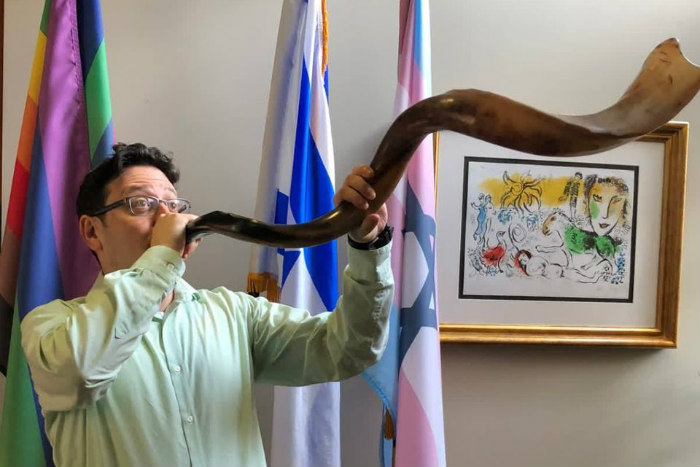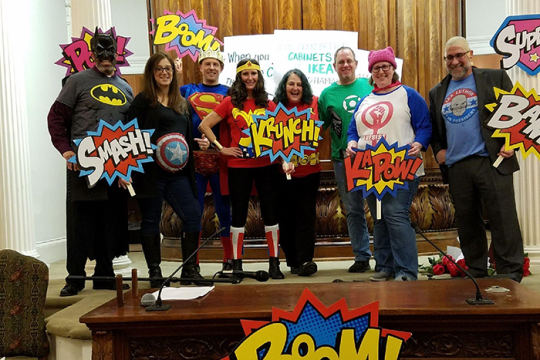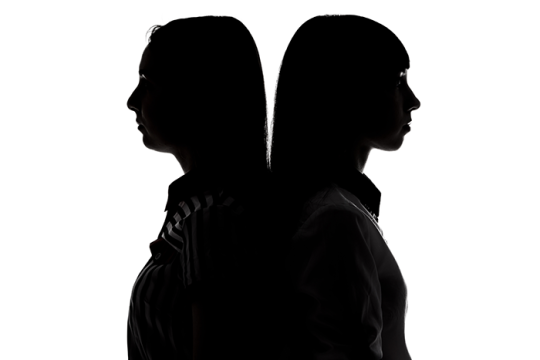
Rabbi Max Chaiken, our Ten Minutes of Torah commentator for the Book of Deuteronomy, is the associate rabbi of Congregation Kol Ami in Los Angeles, CA. (Haven’t been keeping up with his commentaries? You'll find them all here.)
Rabbi Chaiken, who holds a BA in economics and public policy from Brown University, was ordained by Hebrew Union College-Jewish Institute of Religion in 2018. His writing credits include chapters in The Fragile Dialogue: New Voices of Liberal Zionism and The Sacred Exchange: Creating a Jewish Money Ethic.
We caught up with Rabbi Chaiken to talk about his Jewish journey and some of the ideas behind his commentaries on Deuteronomy.
ReformJudaism.org: Who were your early Jewish influencers?
Growing up at Temple Emeth in Teaneck, N.J., I was drawn into Jewish life through music with the help of Cantor Ellen Tilem and our junior choir. My counselors at URJ Camp Harlam, a Reform Jewish summer camp in Kunkletown, PA, sparked a joyful excitement about Judaism in me.
During my high school years, I was deeply influenced by Jewish singer-songwriter Dan Nichols, who fused music I heard on the radio with Judaism. I later spent the summer of 2002 at URJ Kutz Camp, where I learned songleading skills that I use to this day as a congregational rabbi.
In your commentaries, you describe God as a process, as a force present in all space and time. Can such a God hear our prayers?
In short, yes, but I think God hears our prayers differently than we might hear one another.
When I listen to you, or to any other human, I hear your voice, and I can respond; we can engage in dialogue pretty directly. Yet God hears by always being present with us and within us. God acts through us and beyond us at all times – so if I'm sitting alone in my room and I say a prayer or blessing, God hears it.
Speaking words of prayer can make them real, and prayer helps me focus on what I need to do to help bring about the change I seek in myself and in the world.
How does that apply to communal prayer?
Prayer not only connects us with one another and with the spirit of the universe, but also through time via the rhythms and structures bequeathed to us by our ancestors. All this helps to create the framework for us to be present with God and to acknowledge the Divine presence in our lives.
How have the political, economic, and social impact of the COVID-19 pandemic influenced your Torah commentaries?
I started writing back in February, before COVID, before any of the shelter-in-place orders. I am still in shock about how much has changed so quickly in our world, but I’m also inspired by the speed and force with which our Jewish community has adapted.
What has not changed, however, are the eternal values of our tradition, which bring meaning and purpose to our lives. Judaism helps us walk the path of life in partnership with the Divine. The covenant that our ancestors made with God at Sinai endures, regardless of how many times we are forced to transform tradition to meet contemporary demands. I continue to find strength in our adaptability.
What do you miss most about not being able to congregate live?
I really miss the beautiful blending of voices in prayer and song in the synagogue. I have to admit that I also miss the oneg, that wonderful opportunity to grab a cookie or cup of coffee after services and say, “Hello, how are you doing? How's your week been?”
It’s been my experience that we often build deeper and more meaningful relationships during informal moments of connection, and those are much more difficult to create online.
What has surprised you in how congregants have responded to streamed or remote services?
A former board member said to me recently, “I think I've come to services more in the last six months than I had in the previous six years.” The level of engagement has gone up for others, as well. I think this shows that when our world changes in dramatic ways, our communities can become even more important to us. We’ve also seen people offering their skills and expertise to others at Kol Ami, and that inspires me.
Jewish affirmation in times of crisis is nothing new. Our people have transformed our tradition time and again, and we’re in the midst of one of those moments right now. So I feel a debt of gratitude and say kol hakavod – all the honor – to our ancestors who pointed the way in every generation.
Want to receive our weekly Torah commentaries via email? Subscribe to Reform Voices of Torah, sent every Monday as part of our Ten Minutes of Torah series.
Related Posts

Extraordinary Ordinary Heroes



